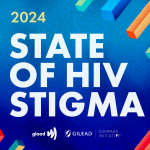What’s the most helpful thing anyone has said to you over your years living with HIV?
“You’re positive, then do something positive,” was the advice given me by Stephen, my then-31-year-old son after he’d observed me spending four years in semi-isolation following my HIV diagnosis. It was Stephen, more than anyone else, who urged me to get up and out of my apartment—and outside of myself—and embark on a new life as a public speaker: an HIV/AIDS prevention educator and activist. It’s a role that has empowered me to help others (in addition to myself), and a role that continues to this day.
What change or development in your treatment for HIV has most affected your life-—for better or worse?
Without a doubt, the introduction in 1996 of protease inhibitors, and subsequently combination antiretroviral therapy, has affected my life like nothing else. The drugs have kept me alive, and for that, I am blessed. By late 1995, my CD4 cells had decreased to the mid-300s, and my viral load was 18,000. Within two months of beginning PI treatment, my CD4 cells had jumped to 1,000 and my viral load had become undetectable. The latter remains so today.
What is your refuge from thinking about and dealing with your health?
I read. I’m a fanatic reader. My preference is biography or autobiography, so that I can escape into someone else’s mind and body. It’s useful to be reminded that all people—even those of great accomplishment or privilege—face obstacles and endure setbacks.
What one thing has most aided your survival, and how difficult is it to overcome stigma?
Emotional support has been critical to my having survived with HIV since my infection at the beginning of 1986. This support comes from friends who continue to “be there” if I need them and offer distractions that keep me from obsessing about the virus. And there’s the ongoing support of my son (my only child) and his family, who live in Toronto. My favorite activity is a visit there with my grandson, 7-year-old Milo, and granddaughter, Matilda, who is 5.
Do you think there will be a cure in your lifetime—and if so, will you benefit from it?
Alas, I don’t think so. Consider my age. I’ll turn 76 on July 4, 2011, and if we have to wait another 30 years or so for a cure, my life will have ended. If, however, there’s a miraculous discovery sooner and I’m still around, of course I intend to try and benefit.
What advice would you give to someone newly diagnosed?
Immediately accept the fact of your virus, and waste no time: Seek medical and social service assistance. Study and learn about HIV/AIDS and understand that it is no longer a death sentence, but something that can be called a chronic disease. You might look outside yourself and consider, if possible, making some kind of contribution to the fight. Coming out as positive, doing the work that I do, has been extremely liberating and gratifying for me. Perhaps it would be for you, too.







Comments
Comments